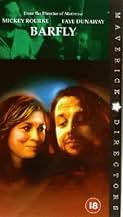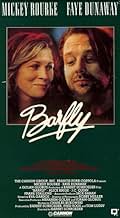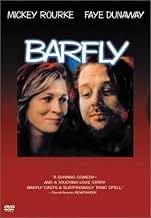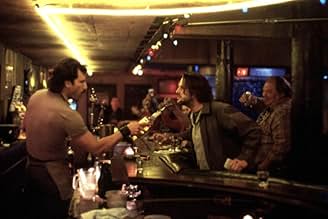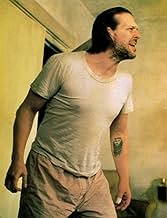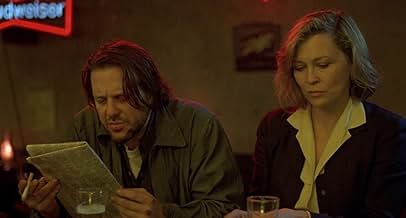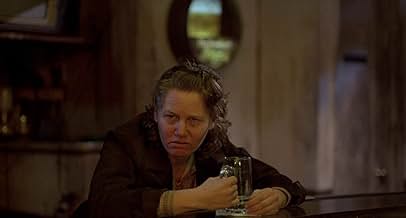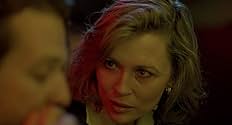Barfly
- 1987
- Tous publics
- 1h 40min
NOTE IMDb
7,1/10
23 k
MA NOTE
Inspiré de la vie du poète Charles Bukowski et de ses exploits à Hollywood dans les années 60, 70 et 80.Inspiré de la vie du poète Charles Bukowski et de ses exploits à Hollywood dans les années 60, 70 et 80.Inspiré de la vie du poète Charles Bukowski et de ses exploits à Hollywood dans les années 60, 70 et 80.
- Réalisation
- Scénario
- Casting principal
- Récompenses
- 6 nominations au total
Gloria LeRoy
- Grandma Moses
- (as Gloria Leroy)
Zeke Manners
- Roger
- (as Zeek Manners)
Avis à la une
I've seen too many movies where one shocked character asks a character who's done something dangerous, "Are you crazy?", but I don't think I've ever heard a character just flatly say "yes," and as casually as Mickey Rourke says it. It's a small moment in a film that has many good small details, but it stuck out.
Barfly hasn't much of a story, instead following one drunken man as he walks and drinks, staggering through life. He's not partying, like in comedies that involve characters abusing alcohol, but neither does he seem to be drinking himself to death, like Nicolas Cage's character in Leaving Las Vegas. It's an interesting and less expected look at alcohol dependency, and the way drinking a lot seemingly every day ultimately changes one's life, usually for the worse, and occasionally for the better (only really in brief spurts for the latter).
But Rourke's character continues to fight through life. He's not likable, but he's interesting. He's a victim to a compulsion for continual drinking, but he doesn't act like a victim, and sometimes it feels like he wants to do what he does. How much agency he has and how much he's subserviant to liquor is interesting to think about.
Mickey Rourke can act. Easy pick, but I remember The Wrestler impressing me the most. Barfly is another performance of his where his physicality is fascinating and admirably committed. I think it's the second-best performance I've seen of his. I've known some kinda drunks in my time and I don't think the mannerisms and the way he moves around a room are too far off the truth. This is not a fun drunk, but neither is it a Leaving Las Vegas "I want death now" drunk. It's something new, and I liked that.
Faye Dunaway is good, I think, but I'll be honest... I'm not sure how credible she is, because I just haven't seen women of that age in that state. She might look a bit too pretty, too, contrasting against Mickey Rourke who looks consistently rough and schlubby throughout in a way I quite respected.
What we have is a sluggish character study of a film, but that central character is good, and Rourke's performance is excellent. Those qualities make Barfly more than worth devoting 100 minutes.
Barfly hasn't much of a story, instead following one drunken man as he walks and drinks, staggering through life. He's not partying, like in comedies that involve characters abusing alcohol, but neither does he seem to be drinking himself to death, like Nicolas Cage's character in Leaving Las Vegas. It's an interesting and less expected look at alcohol dependency, and the way drinking a lot seemingly every day ultimately changes one's life, usually for the worse, and occasionally for the better (only really in brief spurts for the latter).
But Rourke's character continues to fight through life. He's not likable, but he's interesting. He's a victim to a compulsion for continual drinking, but he doesn't act like a victim, and sometimes it feels like he wants to do what he does. How much agency he has and how much he's subserviant to liquor is interesting to think about.
Mickey Rourke can act. Easy pick, but I remember The Wrestler impressing me the most. Barfly is another performance of his where his physicality is fascinating and admirably committed. I think it's the second-best performance I've seen of his. I've known some kinda drunks in my time and I don't think the mannerisms and the way he moves around a room are too far off the truth. This is not a fun drunk, but neither is it a Leaving Las Vegas "I want death now" drunk. It's something new, and I liked that.
Faye Dunaway is good, I think, but I'll be honest... I'm not sure how credible she is, because I just haven't seen women of that age in that state. She might look a bit too pretty, too, contrasting against Mickey Rourke who looks consistently rough and schlubby throughout in a way I quite respected.
What we have is a sluggish character study of a film, but that central character is good, and Rourke's performance is excellent. Those qualities make Barfly more than worth devoting 100 minutes.
Barfly is a rarity in American cinema: a character study that doesn't worry about telling a story with a beginning, middle, and explosive end. Mickey Rourke is excellent as Henry Chinaski, a writer and habitue of skid row who isn't so much slumming as soaking in it. The real surprise here is Faye Dunaway as his love interest: it's easily her best performance since Chinatown and proves she still has it. Also of note is Frank Stallone as Eddie, the barman who keeps getting into one sided fist fights with Henry. A triumph and one of the best American films of the eighties.
What can we say about Barfly? A great picture. That's what we can say. A friend of mine recommended Barfly to me. I watched the start and it said "Some people never go crazy, what truly horrible lives they must live!" After that I was hooked, I knew this guy Bukowski wrote from the gut. I bought as many Bukowski books as possible. Pulp, Hollywood, and Women (my favourite!). I like his novels and short stories more than the poetry. But some of the poems are intense! The movie is also excellent. The two leads are great-Faye Dunaway is in high acting form here. So is Mickey Roarke who seems to have gotten under Bukowski's skin for the role......a side note he did the movie sober! This movie is directed by Barbet Schroeder who also did Reversal of Fortune. He also made the 4 hour Charles Bukowski Tapes (which I own) and it is good, but way too long! Bukowski drinks and reads poems. Back to the film-good supporting actors in this one. The beautiful Alice Krige (from Haunted Summer) is in this as well as David Lynch regular Jack Nance. Lynch was actually on set one day. Bukowski has a funny cameo a barfly in the bar where Mickey meets Faye. I heard that Dennis Hopper wanted to direct this and have Sean Penn star. Schroeder fought hard for it though. Hopper states Schroeder couldn't direct traffic! I guess he proved him wrong. Schroeder went into a production office with a power saw and threatened to cut off his pinky finger if they didn't put more funding into the film. Obviously a labour of love. So check it out if you can, the writing is top notch stuff.......Highly recommended. Thanx.
Despite Bukowski's condemnation of Mickey Rourke's portrayal of him/Chinaski in the film (claiming Rourke was too cocky with the role, and didn't stick to the character of Chinaski as Bukowski intended) states Bukowski in the documentary "Bukowski: Born Into This", I still view it as one of the highlights of Rourke's career.
Whether the depiction of a character is exact in the fashion of perfect mimicry is often irrelevant to me in relation to biopics. As a matter of a fact, I often find it the downfall of some biopics, where the physicality may be captured, but the meat and potatoes of the character's are often left by the wayside. Not so in the instance of "Barfly." Rourke nailed Bukowski/Chinaski's crazy, alcoholic, free spiritedness brilliantly, I felt. There was a humor, a tenderness, a coldness, a twisted romanticism, and a bleakness, all wrapped into a greasy, overweight (Rourke pulled a "De Niro", gaining weight and not bathing months before the film's shooting) package you could almost smell from the theater seats.
Faye Dunaway as the aging, sad, beautiful barfly Wanda, gives a performance that yet again reminds us why she is a cinematic legend in her own time! She plays the subtleties and intricacies of Wanda with such aplomb, offering even this - the most pathetic of her roles - a dignity and a sad beauty that not many actresses can pull off.
The casting of this film deserves a round of applause! I've tended bar and worked in the sorts of joints where these all too real people can be found, and I felt as if I was right there again, pouring shots of bourbon, polishing glasses, and making certain that the brawls boiling in the bar get taken to the streets. Frank Stallone's swaggering, bully-of-a-bar tender, macho-man Eddie is hilarious! Gloria LeRoy as "Grandma Moses" the ancient prostitute infamous for her ability to "swallow paste" is priceless. I could go on and on, but I won't! Bukowski's male character counterpart is a macho, beer swilling, bare knuckle fighting, farting kind of man who some may not appreciate, considering that outside of the seedier bars in North America, these types of fellas are a dying breed. With males being force-fed the over-sensitive, turn the other cheek, annoyingly "metro sexual" kinds of roles models and ideals these days, it must be a strange look back over the evolutionary shoulder for some men to see the realities of people like Bukowski! Don't get me wrong - I'm not applauding all of the Chinaski character's behaviors, but I think that some guys could learn a thing or two about themselves from the worst example of the diametric opposite of what they've been told they should be. Sometimes a fight has to be - sometimes it's just plain pathetic, and both examples can be found in Barfly.
Bukowski has always dared to put to page whatever entered his head, and did so with a twisted lovely flourish.
Barbet Schroeder, the man behind such brilliant and critically acclaimed films such as "More" (1969), his work with director as Jean-Luc Godard, his contribution to French "Nouvelle Vague" or New Wave cinema, and his more mainstream flicks such as "Single White Female", places him in a category above many directors working in North America today.
With Barfly, Schroeder captures the gritty realities of lives given over to the excesses of substances and circumstances in a true-to-life way, as he did with his first film "More", a flick about heroin addiction done at a time when the subject was still considered very taboo. The musical score for Barfly supports this film perfectly, too, with the Hammond organ whirling out Booker T. Jones' "Hip Hug Her" as we P.O.V. our way through the film's first scene, past the bar sign, to the bar's door, and into the world of Henry Chinaski. This is all counter-pointed wonderfully by the use of Mozart and Beethoven under Rourke's voice-overs of Chinaski's writing.
To sum it all up - as much as I dig and respect Bukowski, I have to say that even though he wasn't a fan of the flick (long after its release I may add, and he was on set as an adviser and unaccredited cast member - why didn't he say something at the time?), I look at this movie as a wee gem and as a masterpiece daring enough to capture life's underbelly with an acuteness and accuracy many wouldn't dare to put to screen.
~T.Paul
www.t-paul.com
Whether the depiction of a character is exact in the fashion of perfect mimicry is often irrelevant to me in relation to biopics. As a matter of a fact, I often find it the downfall of some biopics, where the physicality may be captured, but the meat and potatoes of the character's are often left by the wayside. Not so in the instance of "Barfly." Rourke nailed Bukowski/Chinaski's crazy, alcoholic, free spiritedness brilliantly, I felt. There was a humor, a tenderness, a coldness, a twisted romanticism, and a bleakness, all wrapped into a greasy, overweight (Rourke pulled a "De Niro", gaining weight and not bathing months before the film's shooting) package you could almost smell from the theater seats.
Faye Dunaway as the aging, sad, beautiful barfly Wanda, gives a performance that yet again reminds us why she is a cinematic legend in her own time! She plays the subtleties and intricacies of Wanda with such aplomb, offering even this - the most pathetic of her roles - a dignity and a sad beauty that not many actresses can pull off.
The casting of this film deserves a round of applause! I've tended bar and worked in the sorts of joints where these all too real people can be found, and I felt as if I was right there again, pouring shots of bourbon, polishing glasses, and making certain that the brawls boiling in the bar get taken to the streets. Frank Stallone's swaggering, bully-of-a-bar tender, macho-man Eddie is hilarious! Gloria LeRoy as "Grandma Moses" the ancient prostitute infamous for her ability to "swallow paste" is priceless. I could go on and on, but I won't! Bukowski's male character counterpart is a macho, beer swilling, bare knuckle fighting, farting kind of man who some may not appreciate, considering that outside of the seedier bars in North America, these types of fellas are a dying breed. With males being force-fed the over-sensitive, turn the other cheek, annoyingly "metro sexual" kinds of roles models and ideals these days, it must be a strange look back over the evolutionary shoulder for some men to see the realities of people like Bukowski! Don't get me wrong - I'm not applauding all of the Chinaski character's behaviors, but I think that some guys could learn a thing or two about themselves from the worst example of the diametric opposite of what they've been told they should be. Sometimes a fight has to be - sometimes it's just plain pathetic, and both examples can be found in Barfly.
Bukowski has always dared to put to page whatever entered his head, and did so with a twisted lovely flourish.
Barbet Schroeder, the man behind such brilliant and critically acclaimed films such as "More" (1969), his work with director as Jean-Luc Godard, his contribution to French "Nouvelle Vague" or New Wave cinema, and his more mainstream flicks such as "Single White Female", places him in a category above many directors working in North America today.
With Barfly, Schroeder captures the gritty realities of lives given over to the excesses of substances and circumstances in a true-to-life way, as he did with his first film "More", a flick about heroin addiction done at a time when the subject was still considered very taboo. The musical score for Barfly supports this film perfectly, too, with the Hammond organ whirling out Booker T. Jones' "Hip Hug Her" as we P.O.V. our way through the film's first scene, past the bar sign, to the bar's door, and into the world of Henry Chinaski. This is all counter-pointed wonderfully by the use of Mozart and Beethoven under Rourke's voice-overs of Chinaski's writing.
To sum it all up - as much as I dig and respect Bukowski, I have to say that even though he wasn't a fan of the flick (long after its release I may add, and he was on set as an adviser and unaccredited cast member - why didn't he say something at the time?), I look at this movie as a wee gem and as a masterpiece daring enough to capture life's underbelly with an acuteness and accuracy many wouldn't dare to put to screen.
~T.Paul
www.t-paul.com
"Barfly" was a fairly successful film when it was released and garnered generally favorable reviews. Roger Ebert gave it four out of four, and along with "Angel Heart," it helped solidify 1987 as the Year of Mickey Rourke.
However, almost twenty years later it isn't talked so much about anymore, and I feel it deserves to be. Rourke gives one of his finest performances as Henry, a loner who walks hunched over like the Hunchback of Notre Dame. Henry works at a bar as a runner - delivering orders and such. But he's always getting into drunken brawls with the bartender, usually losing.
One day Henry's life takes a turn when he meets a downtrodden woman (Faye Dunaway) and they embark on a relationship.
"Barfly" is a great film. Rourke was vocal later on in his career about his dislike of director Barbet Schroeder, but Schroeder's direction is part of what makes this film so good.
However, the absolute best aspect of the movie is Rourke's performance. Embodying the late writer Charles Bukowski (whose work this was based upon, and who had a brief cameo in the film), Rourke is unrecognizable - like Billy Bob Thornton in "Sling Blade," his entire demeanor and physicality seems to change.
I highly recommend "Barfly" - it's funny, dark, witty, touching and downright enjoyable. One of the best films of the '80s.
However, almost twenty years later it isn't talked so much about anymore, and I feel it deserves to be. Rourke gives one of his finest performances as Henry, a loner who walks hunched over like the Hunchback of Notre Dame. Henry works at a bar as a runner - delivering orders and such. But he's always getting into drunken brawls with the bartender, usually losing.
One day Henry's life takes a turn when he meets a downtrodden woman (Faye Dunaway) and they embark on a relationship.
"Barfly" is a great film. Rourke was vocal later on in his career about his dislike of director Barbet Schroeder, but Schroeder's direction is part of what makes this film so good.
However, the absolute best aspect of the movie is Rourke's performance. Embodying the late writer Charles Bukowski (whose work this was based upon, and who had a brief cameo in the film), Rourke is unrecognizable - like Billy Bob Thornton in "Sling Blade," his entire demeanor and physicality seems to change.
I highly recommend "Barfly" - it's funny, dark, witty, touching and downright enjoyable. One of the best films of the '80s.
Le saviez-vous
- AnecdotesThe apartment building where Wanda's apartment was located was an actual building where Charles Bukowski and his lover Jane Baker Cooley, the real-life counterparts to Henry and Wanda, had lived. No one knew this until Bukowski, who was watching the filming, remembered.
- GaffesWhen Henry gets out of bed, Tully has terrible bedhead as their conversation starts. When the view cuts back to her a second later, her hair is neatly brushed.
- Citations
Wanda Wilcox: I can't stand people, I hate them.
Henry: Oh yeah?
Wanda Wilcox: Do you hate them?
Henry: No, but I seem to feel better when they're not around.
- Bandes originalesHip Hug-Her
By Steve Cropper, Booker T. Jones, Al Jackson Jr. and Donald Dunn
Published by Irving Music, Inc. (DMI)
Performed by Booker T. & the M.G.s
Courtesy of Atlantic Recording Corp.
By Arrangement with Warner Special Products
Meilleurs choix
Connectez-vous pour évaluer et suivre la liste de favoris afin de recevoir des recommandations personnalisées
- How long is Barfly?Alimenté par Alexa
Détails
- Date de sortie
- Pays d’origine
- Langue
- Aussi connu sous le nom de
- Завсідник бару
- Lieux de tournage
- Bryson Apartments, 2701 Wilshire Blvd., Los Angeles, Californie, États-Unis(Interiors and exterios. As Wanda Wilcox's apartment.)
- Sociétés de production
- Voir plus de crédits d'entreprise sur IMDbPro
Box-office
- Budget
- 3 000 000 $US (estimé)
- Montant brut aux États-Unis et au Canada
- 3 221 568 $US
- Week-end de sortie aux États-Unis et au Canada
- 45 900 $US
- 18 oct. 1987
- Montant brut mondial
- 3 221 774 $US
- Durée
- 1h 40min(100 min)
- Couleur
- Mixage
- Rapport de forme
- 1.85 : 1
Contribuer à cette page
Suggérer une modification ou ajouter du contenu manquant


